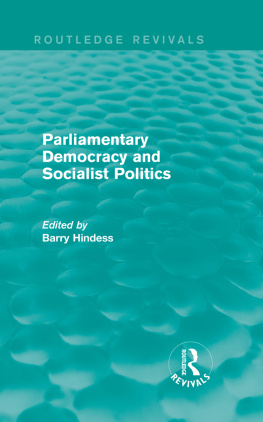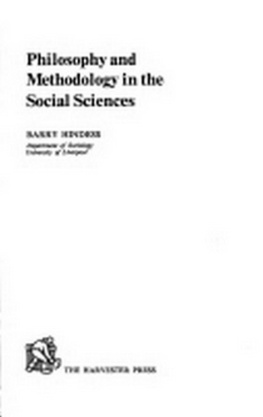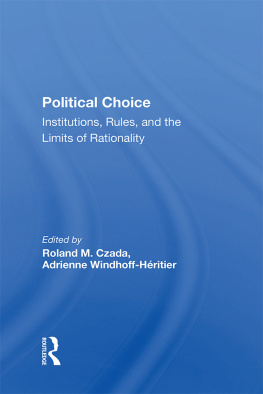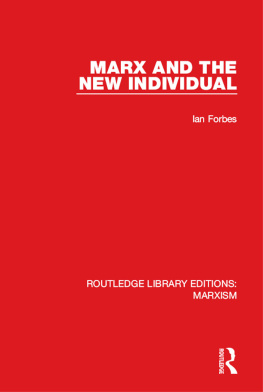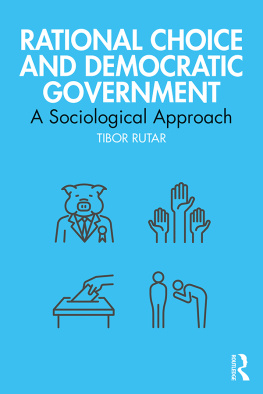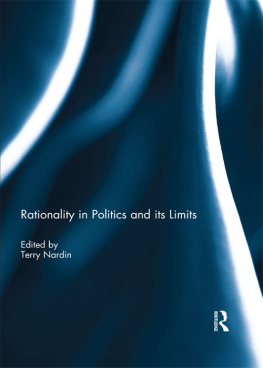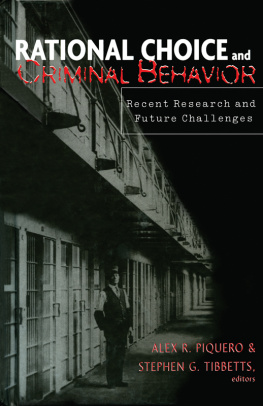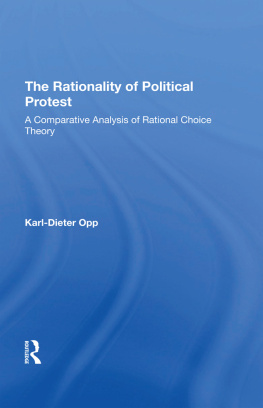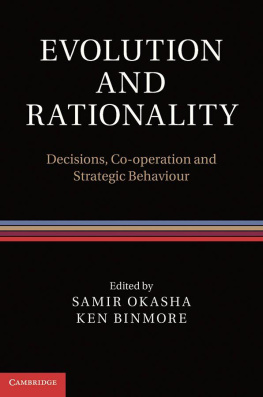ROUTLEDGE LIBRARY EDITIONS: SOCIAL THEORY
Volume 9
CHOICE, RATIONALITY, AND SOCIAL THEORY
CHOICE, RATIONALITY, AND SOCIAL THEORY
BARRY HINDESS
First published in 1988
This edition first published in 2015
by Routledge
2 Park Square, Milton Park, Abingdon, Oxon, OX14 4RN
and by Routledge
711 Third Avenue, New York, NY 10017
Routledge is an imprint of the Taylor & Francis Group, an informa business
1988 Barry Hindess
All rights reserved. No part of this book may be reprinted or reproduced or utilised in any form or by any electronic, mechanical, or other means, now known or hereafter invented, including photocopying and recording, or in any information storage or retrieval system, without permission in writing from the publishers.
Trademark notice: Product or corporate names may be trademarks or registered trademarks, and are used only for identification and explanation without intent to infringe.
British Library Cataloguing in Publication Data
A catalogue record for this book is available from the British Library
ISBN: 978-0-415-72731-0 (Set)
eISBN: 978-1-315-76997-4 (Set)
ISBN: 978-1-138-78225-9 (Volume 9)
eISBN: 978-1-315-76372-9 (Volume 9)
Publishers Note
The publisher has gone to great lengths to ensure the quality of this reprint but points out that some imperfections in the original copies may be apparent.
Disclaimer
The publisher has made every effort to trace copyright holders and would welcome correspondence from those they have been unable to trace.
Choice, Rationality, and Social Theory
BARRY HINDESS
Barry Hindess, 1988
This book is copyright under the Berne Convention. No reproduction without permission. All rights reserved.
Published by the Academic Division of
Unwin Hyman Ltd
15/17 Broadwick Street, London W1V 1FP, UK
Unwin Hyman, Inc,
8 Winchester Place, Winchester, Mass. 01890, USA
Allen & Unwin (Australia) Ltd,
8 Napier Street, North Sydney, NSW 2060, Australia
Allen & Unwin (New Zealand) Ltd in association with the Port Nicholson Press Ltd,
60 Cambridge Terrace, Wellington, New Zealand
First published in 1988
British Library Cataloguing in Publication Data
Hindess, Barry
Choice, rationality and social theory.
(Controversies in sociology; 22).
1. Social sciences. Concepts : Rationality Philosophical perspectives
I. Title II. Series
300. 1
ISBN 0-04-301306-6
Library of Congress Cataloging-in-Publication Data
Hindess, Barry.
Choice, rationality and social theory.
(Controversies in sociology ; 22)
Bibliography: p.
Includes index.
1. Social choice. 2. Choice (Psychology)
I. Title. II. Series.
HB846.8.H56 1988 302. 13 8810698
ISBN 0-04-301306-6 (alk. paper)
Typeset in 10 on 12 point Times and printed in Great Britain by Billing and Sons, London and Worcester
Contents
Many people have helped in the production of this book, through their encouragement, critical discussion and disagreement and through reading and commenting on the manuscript. I am particularly grateful to Tom Bottomore, Frank Cunningham, Stephen Gaukroger, Paul Hirst, Ann Jungmann, Elizabeth Kingdom, Philip Pettit and Gary Wickham.
The terms choice and rationality are used in many different ways in the social sciences, but one of the most influential contemporary usages is to identify rationality with behaviour that maximizes the satisfaction of preferences. The rational choice approach proposes to analyse human behaviour on the assumption that actors are rational in just that sense. Much of social life is then to be explained as the outcome of the rational choices of individual actors. The argument of this book is directed against that and related explanatory usages of the notion of individual rationality. There are, of course, other influential conceptions of rationality (for example, in critical theory) but they are not my concern here.
Models of maximizing behaviour are widely used in economics, and rational choice analysis can be understood as extending that economic approach to other areas of human behaviour. It is in this spirit that Gary Becker informs us that the economic approach
is applicable to all human behaviour, be it behaviour involving money prices or imputed shadow prices, repeated or infrequent decisions, large or minor decisions, emotional or mechanical ends, rich or poor persons, men or women, adults or children, brilliant or stupid persons, businessmen or politicians, teachers or students. (Becker, 1976, p. 8)
Becker goes on to suggest that too many social scientists are tempted to hide their own lack of understanding of their subjects behaviour behind allegations of ignorance and irrationality, values and their frequent and unexplained shifts, custom and tradition, the compliance somehow induced by but it is a style of argument that deserves little consideration.
Beckers argument on this point represents the weakest case for rational choice analysis, but there are more serious arguments to be considered. Adherents of rational choice analysis have claimed that it is rigorous, capable of great technical sophistication and able to generate powerful explanations across a wide range of situations on the basis of a few, relatively simple theoretical assumptions. It also appears to take more seriously than sociological functionalism or structuralism the point that actors do indeed make decisions and act on them. It insists that actors are not mere creatures of their position in some overarching societal totality. No one, of course, would be so foolish as to maintain that action is always rational. The claim of rational choice analysis is not so much that the assumption of rationality is descriptively accurate but rather that it performs an important heuristic function: it is a useful simplification and it provides the means of identifying the place of non-rational elements in human behaviour.
On this view, non-rational elements may be introduced in our analyses only when explanation in rational terms has clearly failed. Jon Elster, for example, clearly recognizes that action is not always rational and that there are problems with the identification of rationality with maximizing behaviour. He nevertheless insists that explanation in terms of optimization remains the paradigm case of intentional explanation in the social sciences outside psychology (Elster, 1983a, p. 75). All other cases of intentional explanation are then to be understood as involving specific departures from the paradigmatic norm.
This book is a critical discussion of some of the more serious claims of rational choice analysis. The clarity and technical sophistication of much rational choice analysis seem to me undeniable, and I do not dispute its claim to a certain kind of rigour. Unfortunately, those positive features of rational choice analysis depend on the adoption of a number of highly questionable assumptions about actors and about their rationality. Those assumptions are the target of my critical discussion. I argue that the theoretical parsimony and explanatory power of rational choice analysis are bought at far too high a theoretical cost, and I dispute both the assumption of actors rationality and the paradigmatic status assigned to it.


